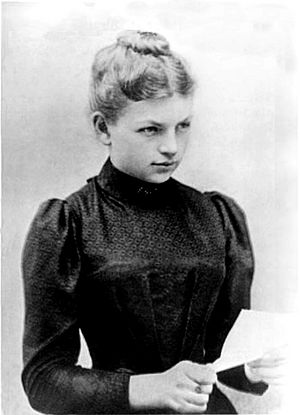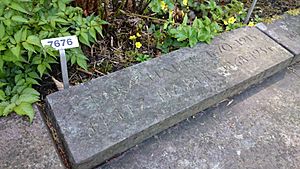Clara Immerwahr facts for kids
Quick facts for kids
Clara Immerwahr
|
|
|---|---|

Clara Immerwahr (1870–1915)
|
|
| Born | 21 June 1870 Polkendorf near Breslau, Silesia Province, Kingdom of Prussia
|
| Died | 2 May 1915 (aged 44) Berlin-Dahlem, Kingdom of Prussia, German Empire
|
| Cause of death | ... by gunshot |
| Nationality | German |
| Alma mater | University of Breslau |
| Spouse(s) | Fritz Haber |
| Scientific career | |
| Fields | Chemistry |
| Doctoral advisor | Richard Abegg |
Clara Helene Immerwahr (21 June 1870 – 2 May 1915) was a German chemist. She was the first German woman to earn a doctorate degree in chemistry in Germany. Many remember her as a pacifist (someone who believes in peace and is against war) and a "heroine of the women's rights movement." From 1901 until her death in 1915, she was married to Fritz Haber, who later won a Nobel Prize for his work in chemistry.
Contents
Early Life and Education
Clara Immerwahr was born on the Polkendorff Farm near Breslau. At that time, this area was part of eastern Prussia, which is now Wojczyce in western Poland. She was the youngest of four children born to Philipp Immerwahr, a chemist, and Anna Krohn.
Clara grew up on the family farm. In 1890, her mother passed away from cancer. While her older sister Elli and her husband stayed on the farm, Clara and her father moved to Breslau.
Achieving a Chemistry Doctorate
Clara Immerwahr studied at the University of Breslau. She earned her PhD in chemistry in 1900, studying under Professor Richard Abegg. She completed her degree after eight semesters, which was two more than male students needed at the time.
Her special research paper was about how certain salts of metals like mercury and copper dissolve. Clara was the first woman to earn a PhD from the University of Breslau. She received high honors for her work. Her final defense was held in the university's main hall, and many young women came to see "our first female doctor." A few months after getting her degree, she gave a public talk called "Chemistry and Physics in the Household."
Marriage and Challenges
Clara Immerwahr married Fritz Haber in August 1901. They had met years earlier at a dance. Clara had turned down his marriage proposal back then because she wanted to be financially independent. She had also converted to Christianity in 1897, four years before their marriage.
Balancing Family and Career
During Clara's time, society expected married women to stay at home and focus on their families. This made it very hard for her to continue her own scientific research. Instead, she helped her husband with his work, often without getting much credit. For example, she translated some of his scientific papers into English.
On June 1, 1902, Clara gave birth to their only child, Hermann Haber. She often felt unhappy about her role. She wrote to her former professor, Richard Abegg, saying that she believed a life was only worth living if one used all their abilities. She felt her life after marriage was "very brief" because her husband often put himself first.
Fritz Haber was often away or working long hours. He even left for a trip to the US when their son was just a few months old. Clara once wrote that her husband worked "18 hours a day, almost always in Berlin."
Speaking Out Against Chemical Weapons
During World War I, Fritz Haber became a strong supporter of the German military. He played a big part in creating chemical weapons, especially poison gas. He even oversaw the first successful use of a weapon of mass destruction in military history in Belgium on April 22, 1915.
Clara Immerwahr strongly disagreed with her husband's work. She reportedly called his research a "perversion of the ideals of science." She believed it was "a sign of barbarity" that was ruining the very field that should bring new discoveries to life. Clara also saw the accidental death of a former classmate, Otto Sackur, who was working with dangerous chemicals in Haber's lab as part of his weapons research.
Death and Legacy

Clara Immerwahr died on May 2, 1915, in her son's arms. The morning after her death, Fritz Haber left to oversee the first gas attack against the Russians on the Eastern Front.
Clara Immerwahr's ashes were later moved from Dahlem to Basel, Switzerland. She was buried there alongside Fritz Haber after he passed away in 1934.
In Books and Films
Many stories, plays, and films have been made about Clara and Fritz Haber's relationship.
- The short film Haber explores some of the issues in their marriage.
- They are also important characters in the novel A Reunion of Ghosts, where they are called Lenz and Iris Alter.
- Works like The Greater Good (2008) show Clara being deeply affected by her husband's work on gas warfare.
- Their lives are also shown in the American TV series Genius.
- In 2014, a film called Clara Immerwahr was released, directed by Harald Sicheritz.
- Clara and Fritz are also mentioned in the book How to Hide an Empire: A History of the Greater United States by Daniel Immerwahr.
See also
 In Spanish: Clara Immerwahr para niños
In Spanish: Clara Immerwahr para niños
 | Misty Copeland |
 | Raven Wilkinson |
 | Debra Austin |
 | Aesha Ash |

